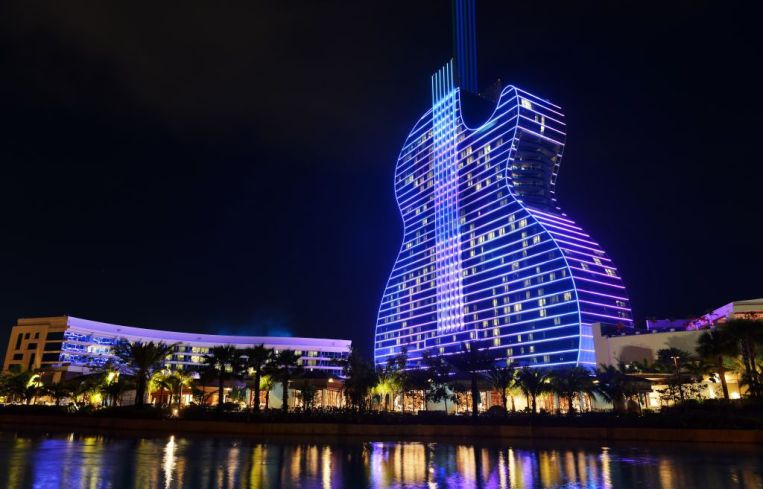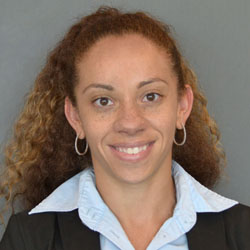Construction Manager Alana Darville on Hard Rock and Hard Hats
By Chava Gourarie December 20, 2022 2:59 pm
reprints
One great thing about Alana Darville’s upcoming job is that it’s a convenient 15-minute commute from her Miami home. Job, in this case, means job site.
Darville is a senior construction manager with Suffolk and, in November, was wrapping up work on the 344-unit Shoma Village in Hialeah. That meant mostly administrative work in the office, and she was ready to get back in the field. Her next project will be a multifamily development in Wynwood by New York-based real estate firm Fisher Brothers.

Darville has worked on several other multifamily projects, as well as CityPlace Doral, a new shopping center, and perhaps most notably the Hard Rock Hotel & Casino in Hollywood, Fla. That’s the guitar-shaped hotel, completed in 2019, that’s impossible to miss for many miles along Interstate 95 — or anywhere else in the vicinity.
Commercial Observer spoke with Darville in November to discuss her work, her journey to construction management, and why she likes to get down and dirty.
The following is an edited version of the conversation.
Commercial Observer: Give us the 30-second intro to Alana Darville.
Alana Darville: I’m Alana. I’m a senior project manager at Suffolk Construction. I’ve been with Suffolk for nine and a half years. I’ve been in the construction industry for 11 years, almost 12 years. I’m originally from the Bahamas and I’ve lived here in South Florida for the past 15 years. And I have two kids. One is 8 months, one is 2.
What got you started in construction management?
As a teenager, when I was in high school back in the Bahamas, I was always interested in buildings, right? How they look, how they’re built, stuff like that. So I figured back then the only way I could get into that was architecture. I didn’t know that there was anything else. So once I graduated, I went to school and started pursuing my degree in architecture. And I realized that it was not what I wanted to do.
My mentors there in college explained to me that there was something called construction management that you got to actually build the buildings and be involved in solving the problems, and that was more what I wanted to do versus actually designing them. So I decided to leave architecture and go into construction management here in Florida. I just started pursuing my bachelor’s at Florida International University in construction management and then from there I started doing it.
I absolutely loved it. Then I hated it. Then I loved it. Then I hated it. It’s a lot. It’s a love-hate relationship, but I do enjoy it.
What are some of the ups and some of the downs?
Well, the biggest positive thing is seeing your work come to life. You can see it, feel it, touch it, be able to drive past it and say, “I built that. I was involved in getting that out of the ground and making it what it is.”
Something like the Hard Rock we finished a few years ago. That one is gonna forever be my, “I did that. I was the first one to do that.”
What was your role in that project?
I was a project manager in charge of all of the interior finishes, the exterior facade lighting, all MEPs [mechanical, electrical and plumbing] on the actual guitar itself — oh, as well as the buildout of the high-end luxury suites.
Apparently, a lot of women were involved in the Hard Rock hotel. Around 30 percent of the team were women, which is high for the construction industry. How did that come to be?
So with the Hard Rock being a billion-dollar-plus project, we had a huge amount of staff. It’s something that you’re not typically accustomed to. Our staff comprised operations, which is the project managers, superintendents as well as our support staff, which would be all of the accountants, estimators, schedulers, administration staff and safety.
We did have a huge amount of women — 30 percent on that particular project. It was spread out amongst all of the different aspects of construction, mostly in what I would call traditional women roles. I don’t want to say it like that, but mostly with the accountants, the administrative support staff. We had quite a bit at the end in our operations and project management and scheduling and stuff like that.
It was a unique experience, especially for me, where I was used to being one of two females on the project. I was a project manager and then it would be like my admin or an accountant, something like that would be the other female on our project. We didn’t really have any true representation in the actual management side
when I first started.
But that was different at the Hard Rock?
At the Hard Rock, it was because I had my direct boss [Jessica Chen]. She was the project executive. I reported to her. I had someone that looked like me that I could relate to, that I could aspire to be like versus it always being, you know, a male because that’s what I’ve always had.
Did it just happen or was there an effort to make it happen? What was special about the Hard Rock?
I know that there was a conscious effort within Suffolk itself to try to increase the number of women in construction. And that project was a good one to be able to do that because there was so much need and so much staff on it, so they could bring in women to help run that job.
Jessica was very, very big on women in construction, so she tried to bring as many women on her team. That was like her focus. So that’s one of the reasons I think there were a lot more women there as well.
And now is that still the case? Since joining Suffolk 10 years ago, are there more women in the construction management side and leadership?
Absolutely. Yeah. There’s actually quite a lot more used to just be. I can count on one hand how many girls were in project management. Even now, on the supervision side, we have a lot more females that want to be superintendents, which is a little more challenging; that’s a lot more male-dominated within the construction industry itself.
There’s always at least two to three females on a project team, depending on the size of the project — which is a big difference than having one, if you had one, on the job.
How did you celebrate when the Hard Rock was finished?
The day I celebrated was the day they did the grand opening, which was our biggest goal. We had to get everything done in order for them to have that big, elaborate party. We still have work after that. But the bulk of it was done, the biggest headaches, the seven-days-a-week working and crazy hours were pretty much done up until that point, so that was celebratory. Like, “OK, thank goodness. Maybe I could go back to working six days a week.”
Day to day, do you work in an office? Do you go on site? What’s a typical day like?
So, typically, yeah, we’re project-site based. So we work in a trailer or an office on the actual project. So we’re boots on the ground, in the dirt literally. Right now, because we’re in closeout, I’m in the main office working from there, just dealing with the final paperwork and all of that, but usually project-based — which is the best.
That’s the part you like?
I love, yeah, getting dirty.
Why did you choose to come to South Florida to pursue your BA in construction management?
Mostly because of the weather. It was similar to the Bahamas, and proximity to where I originally grew up. After doing my degree here, I really felt at home so I decided to stay. Plus the weather, you can’t beat it.
Did you ever wanna go back?
I do want to eventually go back home. Though there’s not a lot of opportunity, specifically for women within this type of industry. They have a very traditional chauvinistic view of what women can do and they don’t really afford those opportunities to women, especially young women.
How can the industry be more inviting and do better at bringing in more women on board?
Giving more exposure to younger girls to what is out there and what you can do within STEM. Because it’s important that girls know that they’re not restricted to the traditional roles that society says. That you can do whatever you want and you can go into what they consider a man’s world and dominate. And be the boss.
Are there challenges, once a woman is already in the field, to advancing?
It’s all based on the people that you work with, right? You will always have that one person
that will try to keep you down. So if you don’t have somebody that’s behind saying, “No. Stop. She knows what she’s doing”… If you don’t have that, then it will be challenging. It is definitely your team or your mentor that can counteract that, but you never know what you’ll get.
Do you ever point out the Hard Rock to your older kid?
I do, but he doesn’t understand it too much, just quite yet. So maybe once he gets a
a little bit older and he’s like “Ohh, look at the lights, Mommy.”
“Yeah,” she’ll answer. “Mommy did that.”



